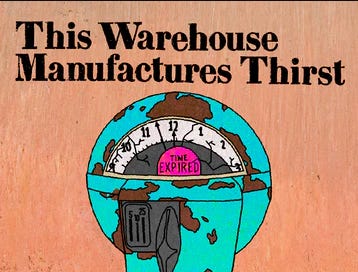Drew Rader Hanson is a poet from South Florida. He’s also a scholar, lawyer, and photographer, all of which come to light in his work through references to ancient Greece, labor history in London, and flora native to Florida. He writes often about human decay in contrast to the resilience of the natural world and examines how and where the two meet with a soft touch, nonjudgemental in its delivery. The voice in the poems of this collection is clear and vulnerable, making room for lines full of beauty and details of nature linked with lines unflinching in their portrayal of deterioration. His poetry has been published in JMWW, Afterimages, Clackamas Literary Review, and elsewhere.
The cover of Hanson’s debut poetry collection features a parking meter showing years of wear, invoking the city streets of the poems within. Purple flowers climb the meter’s base like the cleomes mentioned in two of the poems. The cover showcases some themes Hanson’s poems touch on in This Warehouse Manufactures Thirst: workers and laborers; locales like Miami and London; nature, specifically birds, flowers, trees; Greek and labor history; and religion. The poems are tightly connected as a collection, tying nature and Biblical references to history and modern problems. As I read, I felt the urge to research the places in the poems, both modern and historical, and this experience was heightened by images invoked by the poems, which stayed with me during the weeks I spent reading.
The first poem in the collection, “A Suburban Elegy,” highlights this theme of nature dying or decaying alongside man. The poem begins, “This morning/crime scene tape / tightens around / the palm trees,” a recognizable image of the natural world and Florida icon of beach life, while man’s death interjects. “Commuters … slip into work” despite a local tragedy, despite the violence all around, “while the songbirds / remain silent / near the railway.” The railway and trains reappear in other poems in this collection as Hanson paints a picture of a Florida both wild and contained, insulated and connected. Near the palm trees and the train tracks, an oak tree “hollow molds / into a mouth angled / like everyday anguish—,” the physical world transformed in horror.
In “Vauxhall Vignettes” and later in “Vauxhall,” Hanson takes the reader to London where nature struggles to coexist with the area once home to the city’s laborers: “birds trade wings for scraps of plastic / & spikes line windows in wait for them.” As for man, Hanson displays careful word choice: “Prescription bottles line pockets, / then dot the ground like die.” Humans die, but so do the structures and monuments they’ve erected. In the latter of the two poems, “The cracked sidewalks teeth / the streets cariously” in a city made vulnerable and human in its demise. Hanson plays with words here, using “teeth” as a verb so that the structures of the city eat themselves. It’s innovative and deliberate, as he chooses “cariously” in keeping with the image of teeth, the part of our bodies remaining long after our death.
Other poems invite playfulness while evoking a strong sense of place. In “Sweetness,” the “hummingbird whirs / through the Appalachian air / & its wings can only be imagined.” Here he acknowledges the delicate and impossible beauty of the bird, and the flower also known as a spider flower: “only intricacy permits it, / & the sweetness needling / out of the nearest cleomes—” In “Miami,” named for the poet’s birthplace, “anyone / arrives through the door warmly, / & sweat seals our skin together / in cheek-kisses. Like a nimble infant.” This idea of a seal is repeated with “In the storms of June, / the water breaks from the teal sea, / like a seventh seal and passes / ominously” which suggests catastrophic events, biblical floods, and this contrast of imagery is arresting: cheek kisses, skin warm and firm but yielding like that of a ripe fruit pressed, with the background threat of a sweeping flood.
“Christ Born in a Packaging Plant” and “Siphon” touch on the contrast of the sacred and the profane, humans in nature versus humans in service to a manager, and the buildings housing these jobs. From “Siphon”: “the exoskeletal factories snicker / the silicone trills as the office desks / and delivery trucks are destined for the block.”
“CHEAP,” a standout in the collection for its vulnerability and layered meaning, follows the speaker in a reminiscence of youth, when “We were young & cruel / & the tractor cleared / a pathway like a gash.” Here, they find a snake left mangled in the “rubble,” which they take home, considering themselves to be “good kids,” and they realize their kill is “kin riddled, oozing out of the womb.” Then, they are “shocked at the / body-bruised shine / & saw the cheap iridescence of oil—.” One pictures the beautiful and brutal final form of the snake, its life, and the possibility of life ended, which culminates in a feeling of regret and recognition.
The historical and biblical references in the poems invited me to investigate further and served as a reminder of the systems which built the structures in decay, both physical and otherworldly, within these poems, to consider what came before the sidewalk cracked and the buildings burned and the snake was split, to find the stubborn beauty snaking up the parking meter.
This Warehouse Manufactures Thirst
Published by Bottlecap Press
28pgs
Paperback | September 2024 | $15.00
Suzy Eynon's work has been published in Roanoke Review, Passages North, Autofocus, X-R-A-Y, and others. Her micro chapbook, Commuting, was published by Ghost City Press. and with a forthcoming chapbook titled Being Seen by Ethel Press in July 2025. She edits fiction at Variant Lit and JMWW. Originally from Arizona, she lives in Seattle. See more at https://suzyeynon.com







